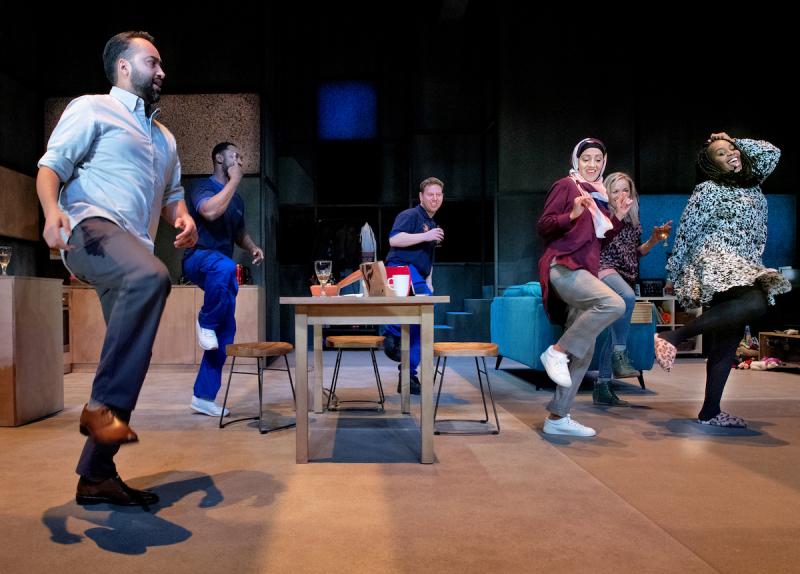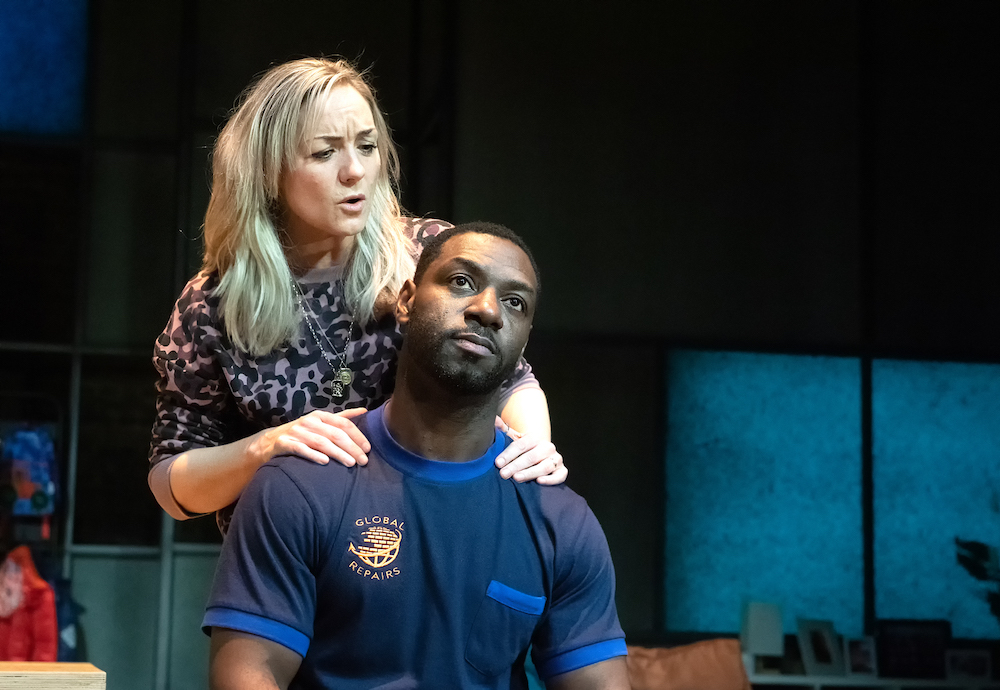A Kind of People, Royal Court review - multiculturalism falls apart | reviews, news & interviews
A Kind of People, Royal Court review - multiculturalism falls apart
A Kind of People, Royal Court review - multiculturalism falls apart
Family tragedy is emotionally powerful but incomplete and unsatisfying

The trouble with prejudice is that you can't control how other people see you. At the start of her career, playwright Gurpreet Kaur Bhatti's work was set in her own Sikh community.
A Kind of People begins as a warm-hearted comedy. We are in the council flat of Gary and Nicky Sinclair, who have been a couple since their early teens. He's black British; she's a working-class white woman. He works an electrical engineer, she does shifts at a local pub, and tonight they are hosting a birthday party for his colleague Mark. Their Asian friends Mo and Anjum are also there, and so is Karen, Gary's sister. The children of both couples go to the same school and their parents are preparing them for the 11 plus. For the celebrations, Victoria – who is Gary's manager at work and white – joins them and this could be awkward: Gary is going for a promotion, and she can't hold her drink.
Amid the bright comedy of this opening, the play's racial theme emerges when Victoria, in an excruciating sequence, is so drunk that she demands that Gary teach her how to twerk. He holds her off but, perhaps predictably, this has consequences when he is interviewed for the promotion. At the same time, tensions arise as Anjum tries to help Nicky to get tuition for her son Ronnie. While this help is appreciated, there's a competitive aspect to this other couple which the playwright emphasises to good effect. Gradually, scene by sad scene, Gary and Nicky's marriage comes under intolerable strain because of the pressures of work and their ambition that their children should have a better start in life. It all gets very depressing.
 At its best, this is an empathetic study of the corrosive effects of racism: there's an outstanding scene in which Gary, with a bit of help from his mate Mark, confronts a racist at work. He points out how when people look at him they only see a black man, not a human being. Or just another co-worker. The writing complicates this easy denunciation by allowing both men to lose their tempers and threaten the physically weaker racist. Further complications are also welcome: Karen doesn't agree with her brother's attack on the latent and persistent racism of British society, and there are tensions between black Britons of Caribbean heritage and Africans, and between black and Asian Britons. The sunny multicultural mix of the play's start becomes increasingly turbulent. And this feels right.
At its best, this is an empathetic study of the corrosive effects of racism: there's an outstanding scene in which Gary, with a bit of help from his mate Mark, confronts a racist at work. He points out how when people look at him they only see a black man, not a human being. Or just another co-worker. The writing complicates this easy denunciation by allowing both men to lose their tempers and threaten the physically weaker racist. Further complications are also welcome: Karen doesn't agree with her brother's attack on the latent and persistent racism of British society, and there are tensions between black Britons of Caribbean heritage and Africans, and between black and Asian Britons. The sunny multicultural mix of the play's start becomes increasingly turbulent. And this feels right.
The main problem with this story is that, told at a brisk 95 minutes, there is not enough time to satisfyingly explore the relationship between Gary and Nicky, and most of the other characters are underwritten. Oddly enough, in a drama whose politics oppose stereotyping, most of the characters never develop beyond rather thin types. Sadly, there are also too many passages in which characters tell the audience what to think, instead of just showing us. So while there's some powerfully provocative material – especially acute when Kaur Bhatti perceptively observes the stupidities of male behaviour (regardless of skin colour) – too much of writing feels like a first draft. At the end, it all feels incomplete.
Michael Buffong's production is unashamedly polemical, but is not helped by the fact that the Sinclairs' ordinary council flat has incomprehensibly been designed by Anna Fleischle to resemble a city penthouse. As far as the acting is concerned, there are solid performances from Richie Campbell and Claire-Louise Cordwell as Gary and Nicky (pictured above), with good support from Asif Khan and Manjinder Virk as Mo and Anjum. Thomas Coombes and Amy Morgan give Mark and Victoria some shades of complexity, while Petra Letang's acid-tongued Karen is a real audience pleaser. But the trouble with this evening is that all this is not enough – you are left aching for more.
rating
Share this article
The future of Arts Journalism
You can stop theartsdesk.com closing!
We urgently need financing to survive. Our fundraising drive has thus far raised £49,000 but we need to reach £100,000 or we will be forced to close. Please contribute here: https://gofund.me/c3f6033d
And if you can forward this information to anyone who might assist, we’d be grateful.

Subscribe to theartsdesk.com
Thank you for continuing to read our work on theartsdesk.com. For unlimited access to every article in its entirety, including our archive of more than 15,000 pieces, we're asking for £5 per month or £40 per year. We feel it's a very good deal, and hope you do too.
To take a subscription now simply click here.
And if you're looking for that extra gift for a friend or family member, why not treat them to a theartsdesk.com gift subscription?
more Theatre
 Edinburgh Fringe 2025 reviews: Kinder / Shunga Alert / Clean Your Plate!
From drag to Japanese erotica via a French cookery show, three of the Fringe's more unusual offerings
Edinburgh Fringe 2025 reviews: Kinder / Shunga Alert / Clean Your Plate!
From drag to Japanese erotica via a French cookery show, three of the Fringe's more unusual offerings
 The Two Gentlemen of Verona, RSC, Stratford review - not quite the intended gateway drug to Shakespeare
Shakespeare trying out lots of ideas that were to bear fruit in the future
The Two Gentlemen of Verona, RSC, Stratford review - not quite the intended gateway drug to Shakespeare
Shakespeare trying out lots of ideas that were to bear fruit in the future
 Edinburgh Fringe 2025 reviews: The Horse of Jenin / Nowhere
Two powerful shows consider the Israeli-Palestinian conflict, with mixed results
Edinburgh Fringe 2025 reviews: The Horse of Jenin / Nowhere
Two powerful shows consider the Israeli-Palestinian conflict, with mixed results
 Edinburgh Fringe 2025 reviews: The Fit Prince / Undersigned
A joyful gay romance and an intimate one-to-one encounter in two strong Fringe shows
Edinburgh Fringe 2025 reviews: The Fit Prince / Undersigned
A joyful gay romance and an intimate one-to-one encounter in two strong Fringe shows
 Tom at the Farm, Edinburgh Fringe 2025 review - desire and disgust
A visually stunning stage re-adaptation of a recent gay classic plunges the audience into blood and earth
Tom at the Farm, Edinburgh Fringe 2025 review - desire and disgust
A visually stunning stage re-adaptation of a recent gay classic plunges the audience into blood and earth
 Works and Days, Edinburgh International Festival 2025 review - jaw-dropping theatrical ambition
Nothing less than the history of human civilisation is the theme of FC Bergman's visually stunning show
Works and Days, Edinburgh International Festival 2025 review - jaw-dropping theatrical ambition
Nothing less than the history of human civilisation is the theme of FC Bergman's visually stunning show
 Every Brilliant Thing, @sohoplace review - return of the comedy about suicide that lifts the spirits
Lenny Henry is the ideal ringmaster for this exercise in audience participation
Every Brilliant Thing, @sohoplace review - return of the comedy about suicide that lifts the spirits
Lenny Henry is the ideal ringmaster for this exercise in audience participation
 Edinburgh Fringe 2025 reviews: The Beautiful Future is Coming / She's Behind You
A deft, epoch-straddling climate six-hander and a celebration (and take-down) of the pantomime dame at the Traverse Theatre
Edinburgh Fringe 2025 reviews: The Beautiful Future is Coming / She's Behind You
A deft, epoch-straddling climate six-hander and a celebration (and take-down) of the pantomime dame at the Traverse Theatre
 Good Night, Oscar, Barbican review - sad story of a Hollywood great's meltdown, with a dazzling turn by Sean Hayes
Oscar Levant is an ideal subject to refresh the debate about media freedom
Good Night, Oscar, Barbican review - sad story of a Hollywood great's meltdown, with a dazzling turn by Sean Hayes
Oscar Levant is an ideal subject to refresh the debate about media freedom
 Edinburgh Fringe 2025 reviews - Monstering the Rocketman by Henry Naylor / Alex Berr
Tabloid excess in the 1980s; gallows humour in reflections on life and death
Edinburgh Fringe 2025 reviews - Monstering the Rocketman by Henry Naylor / Alex Berr
Tabloid excess in the 1980s; gallows humour in reflections on life and death
 Edinburgh Fringe 2025 reviews: Lost Lear / Consumed
Twists in the tail bring revelations in two fine shows at the Traverse Theatre
Edinburgh Fringe 2025 reviews: Lost Lear / Consumed
Twists in the tail bring revelations in two fine shows at the Traverse Theatre
 Make It Happen, Edinburgh International Festival 2025 review - tutting at naughtiness
James Graham's dazzling comedy-drama on the rise and fall of RBS fails to snarl
Make It Happen, Edinburgh International Festival 2025 review - tutting at naughtiness
James Graham's dazzling comedy-drama on the rise and fall of RBS fails to snarl

Add comment